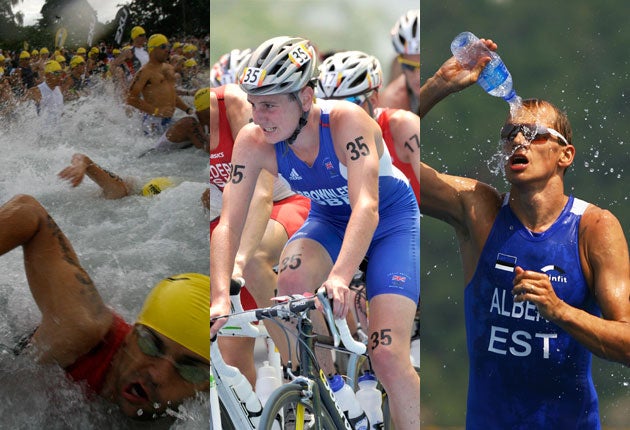Warning over triathlon death rate
Participants twice as likely to die as marathon runners, study concludes

Your support helps us to tell the story
From reproductive rights to climate change to Big Tech, The Independent is on the ground when the story is developing. Whether it's investigating the financials of Elon Musk's pro-Trump PAC or producing our latest documentary, 'The A Word', which shines a light on the American women fighting for reproductive rights, we know how important it is to parse out the facts from the messaging.
At such a critical moment in US history, we need reporters on the ground. Your donation allows us to keep sending journalists to speak to both sides of the story.
The Independent is trusted by Americans across the entire political spectrum. And unlike many other quality news outlets, we choose not to lock Americans out of our reporting and analysis with paywalls. We believe quality journalism should be available to everyone, paid for by those who can afford it.
Your support makes all the difference.It is one of the fastest-growing Olympic sports and one of the most gruelling. But a series of deaths among competitors in the triathlon has raised concerns about whether the physical demands of the race are too great.
A record 100,000 competitors took part in 700 events in the UK last year, organised under the auspices of the British Triathlon Association and that total is set to be exceeded this year. All the races involve three phases – swimming, cycling and running – but can be of varying lengths from the "sprint" to the punishing "iron man" – a 2.4-mile swim, 112-mile bike ride and 26.2-mile run (as for a marathon).
Now a study has revealed that the risk of dying in a triathlon, though low, is nearly double the risk of dying in a marathon. A study presented to the American College of Cardiology Conference showed there were 14 deaths among almost one million competitors, a rate of 1.5 per 100,000. A further four deaths occurred among non-officially recognised events.
No study has been conducted in the UK, but two deaths have occurred in recent British triathlons, one during the bike race and one involving a competitor who died after the event, while asleep. Both had heart abnormalities.
In the US, 13 of the 14 deaths occurred during the first portion of the swim phase, leading doctors to speculate that the stress of jumping into cold water under competitive conditions could cause vulnerable people to hyperventilate or suffer a heart attack.
Cold water constricts blood vessels, forcing the heart to work harder which can trigger a heart attack. Most competitors train in pools and may not be used to swimming in open water where the combination of cold, wind, thousands of rivals splashing alongside and the lack of anything to cling on to may lead some into difficulty.
Kevin Harris, a cardiologist at the Minneapolis Heart Institute of Abbott Northwestern hospital who presented the results, said the risk was not large, but was also "not inconsequential". Triathlons were events that people "just signed up to," without a medical check-up for heart problems and they trained by swimming lengths in their local pool which was "lot different from swimming in a lake or river".
USA Triathlon has recorded 23 deaths in the event since 2004 of which 18 have occurred during the swim. At least seven of these were experienced competitors. Postmortems have shown people in good health without an obvious cause of death, such as blocked coronary arteries, suggesting heart rhythm problems may have been the cause.
Cardiologists have speculated that swimming may trigger a type of heart rhythm malfunction called long QT syndrome. This is an inherited condition affecting about one in 2,000 of the population that can result in the heart skipping a beat after which its electrical system goes haywire, which can be potentially fatal. The adrenaline rush at the start of a race could aggravate conditions such as long QT syndrome. Zara Hyde Peters, chief executive of the British Triathlon Association said deaths during the event were "very rare" and had a variety of causes. Suggestions that swimming could trigger an abnormal heart rhythm were speculative.
"I cannot comment on the US research because we do not know enough about the circumstances in which the deaths occurred ... We operate an event-permitting system to ensure the event is safe for competitors and that anything that can be prevented is prevented. But individuals still have a responsibility to follow the advice that is given."
Gary O'Donovan, an exercise physiologist at the University of Exeter, said the idea that triathlons were dangerous was nonsense.
"It is sedentary living that is killing people, not exercise. The last thing we need is a suggestion that exercise is bad for you."
Join our commenting forum
Join thought-provoking conversations, follow other Independent readers and see their replies
Comments